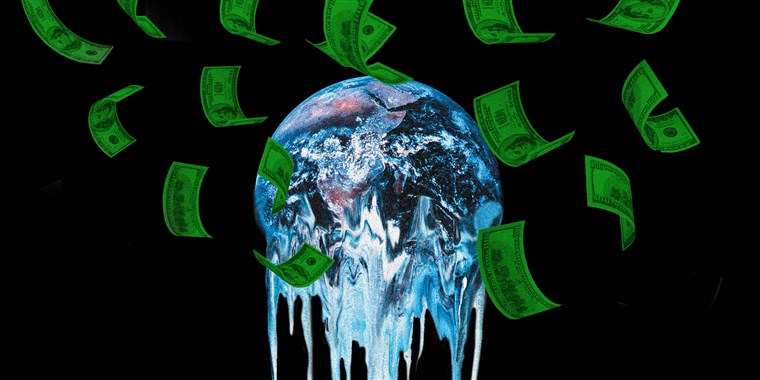Wealth gap and climate change

Have you heard of the concept of planetary boundaries? A concept stating that life on earth depends on a delicate balance of various processes and reactions that interlink forests, biodiversity, earth’s climate and other geological processes. It is within the 9 planetary boundaries that humanity can truly develop and thrive for generations to come. Crossing these boundaries increases the risk of generating large-scale abrupt or irreversible environmental changes.
Have we crossed any of these boundaries? Why, yes of course. Humans being humans have already crossed 4 of our 9 planetary boundaries (climate change, loss of biosphere integrity, land system change, altered biogeochemical cycles). And accordingly, we’ve witnessed catastrophic events like wildfires, melting glaciers, unnatural weather patterns to name a few. 
The 9 planetary boundaries
If you’re wondering how any of this is related to billionaires and climate change in any way, well it technically isn’t. But it’s essential to keep ourselves informed of this concept and how we can disturb this balance through some of our activities that have a considerable carbon footprint. Billionaires, or the rich, in general generally tend to follow a lifestyle that consumes a lot of resources. We don’t mean to wealth-shame anyone but it is no secret that billionaires, or the extremely rich, in general, have been known for their carbon-heavy mode of lifestyle which often tends to disturb this planetary boundary we just discussed.
The same applies to wealthier countries across the globe. The per capita consumption in several countries Europe and North America far exceed that of the poorer countries in Asia and Africa. The average ecological footprint in countries like The UK is 6.69 global hectares per person. That means if everybody in the world had this lifestyle we would need 3.7 planets to support us all!
Of course, there has been an increase in the desire to lead conscious lifestyles that are more earth-friendly (hello, zero waste living!) but this, unfortunately, isn’t enough to neutralize all the damage caused yet.
Of late we’ve been seeing how several of the richest people in the world have been doing their bit for the environment. The most popular being Jeff Bezos, who recently stepped down as CEO of Amazon to dedicate his attention to projects like his Earth Fund, where he pledged to donate $10 billion to help combat climate change.
Not sure if that’s enough funding? To give you context, $10 billion is about what the United States has historically spent annually on climate-related research and development, and it’s also around 5 per cent of Bezos’s wealth!
There have been other extremely generous wealthy donors who’ve made similar donations like the Legendary value investor Jeremy Grantham has famously vowed to give away 98% of his wealth, or $1 billion, to reverse the course of global warming.
And of course, we all know of the revolutionary Bill Gates and his incredible work towards battling climate change through his book ‘How to Avoid a Climate Disaster’, his several policies to tackle the climate crisis and of course, his numerous donations for the same. He even wrote in his new book, “I own big houses and fly in private planes — in fact, I took one to Paris for the climate conference — so who am I to lecture anyone on the environment?”
“I own big houses and fly in private planes — in fact, I took one to Paris for the climate conference — so who am I to lecture anyone on the environment?”
All of this sounds like climate change can really see a turn of events thanks to these generous donations, right? But can it? Unfortunately no. Over and over again, the evidence points to the fact that billionaires – and millionaires, for that matter – are incompatible with planetary boundaries due to the huge carbon footprint associated with their lifestyles.
In order for this class of people to truly make an impact on the planet, they will have to take charge of their ‘purchasing power’ as The French economist Thomas Piketty said. Seems like a mindful lifestyle really is the solution for a huge chunk of our worries.
There needs to be a balance of income and power across society for all of us to lead a respectful lifestyle without causing adverse effects on the planet’s life.
Not convinced yet? Check out this research paper that shows how an equal society ends up generating a greater ecological footprint.
While it would be quite a noble and helpful deed if all the billionaires and millionaires joined hands to use their finances to fight climate change (a zero-waste enterprise can dream!) it certainly will not end all the planet’s worries. Mind you, we’re not looking to defame the rich and mighty. After all, a lot of them got there through hard work and determination and are an inspiration to many. But we all need to understand that taking our lifestyles into account and trying to be mindful in any small way possible, can really go a long way!
Not sure how to lead a mindful lifestyle? We’ve got you covered. Check out our host of blogs, courses and social media handles to learn more. But if you’re looking for something that’s quite comprehensive, feel free to check out our latest book ‘Bare Necessities: How to live a zero waste life’ authored by Sahar Mansoor and Tim de Ridder. Ps: It is currently the #1 bestseller on the Ecotourism list on Amazon too!
Written by: Reshma Bhat
